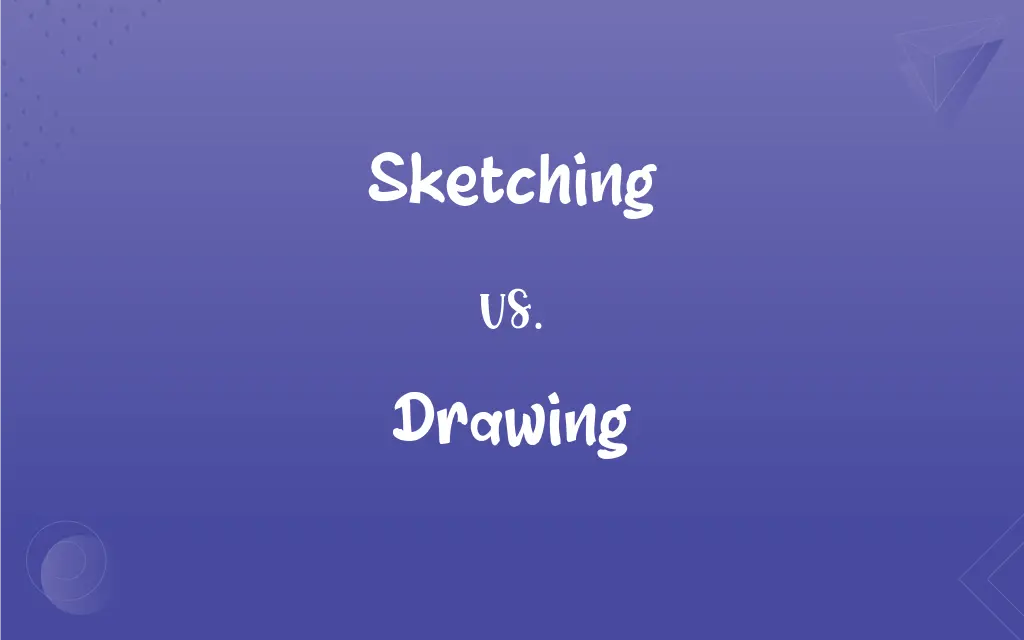Sketching vs. Drawing: What's the Difference?
Edited by Aimie Carlson || By Harlon Moss || Published on January 31, 2024
Sketching is a free-form, often quick, and preliminary form of drawing, used for capturing ideas or concepts. Drawing is a more detailed, refined, and often finished art form.

Key Differences
Sketching is typically characterized by rapid, loose lines, often without much detail, used to quickly jot down ideas or concepts. Drawing, in contrast, involves more careful, detailed line work, often resulting in a finished piece.
Sketching is often used as a preliminary step in the artistic process, allowing artists to explore ideas and compositions. Drawing, however, can be both a preparatory process and an end in itself, with a focus on completeness and refinement.
The tools used for sketching are often light and portable, such as pencils or charcoal, facilitating quick and spontaneous creation. Drawing tools can vary widely, from pencils and pens to ink and pastels, catering to the need for precision and detail.
Sketches are usually not intended for display, serving more as a personal or preparatory step in the creative process. Drawings, on the other hand, are often created with the intention of being complete artworks, suitable for presentation or display.
The skill set for effective sketching includes the ability to quickly capture the essence of a subject with minimal lines. Drawing skills, conversely, encompass a wider range of techniques and attention to detail, including shading, texture, and accurate proportions.
ADVERTISEMENT
Comparison Chart
Purpose
Capturing ideas, preliminary work
Creating detailed, refined artworks
Detail Level
Generally less detailed
More detailed and refined
Time Spent
Usually quick, spontaneous
Often more time-consuming
Tools Used
Light and portable, like pencils
Varied, including ink, pastels, pencils
End Goal
Conceptualization, not necessarily final
Finished, presentable artwork
ADVERTISEMENT
Sketching and Drawing Definitions
Sketching
Sketching serves as an initial stage of the artistic process.
The artist began with sketching to layout the composition.
Drawing
Drawings are often considered complete works of art.
The gallery displayed drawings that showcased intricate line work.
Sketching
Sketching is used to brainstorm or conceptualize ideas.
Designers use sketching to visualize initial concepts.
Drawing
Drawing is creating art by marking surfaces, often for detailed work.
She spent hours drawing the portrait to get every detail right.
Sketching
Sketches are often less detailed and more spontaneous.
His notebook was filled with quick sketches from his travels.
Drawing
In drawing, various tools are used to achieve different effects.
He used charcoal for drawing because it allowed for dramatic contrasts.
Sketching
In sketching, the emphasis is on speed and fluidity.
During her daily commute, she enjoyed sketching fellow passengers.
Drawing
Drawing involves a range of artistic techniques and precision.
His drawing skills improved with practice, mastering shading and texture.
Sketching
Sketching is rapidly drawing an object or idea using loose strokes.
She was sketching the landscape to capture its essence quickly.
Drawing
Drawing requires attention to detail, composition, and proportions.
Architectural drawings require precise measurements and scales.
Sketching
A hasty or undetailed drawing or painting often made as a preliminary study.
Drawing
The act or an instance of drawing.
Sketching
A brief general account or presentation; an outline.
Drawing
The art of representing objects or forms on a surface chiefly by means of lines.
Sketching
A brief, light, or informal literary composition, such as an essay or a short story.
Sketching
(Music) A brief composition, especially for the piano.
Sketching
A short, often satirical scene or play in a revue or variety show; a skit.
Sketching
(Informal) An amusing person.
Sketching
To make a sketch of; outline.
Sketching
To make a sketch.
Sketching
Present participle of sketch
Sketching
Something drawn briefly and basically; a sketch.
A collection of Chinese sketchings
FAQs
What is the main purpose of sketching?
Sketching is primarily used for quickly capturing ideas and concepts.
Can drawing be part of a larger artistic process?
Yes, drawing can be both a standalone art form and part of a larger creative process.
Is attention to detail more important in drawing or sketching?
Attention to detail is typically more important in drawing than in sketching.
Can digital tools be used for sketching?
Yes, digital tools like tablets and software are commonly used for sketching.
Do professionals use sketching in their work?
Yes, many professionals like designers and architects use sketching in their work.
Can a sketch become a drawing?
Yes, a sketch can evolve into a more detailed and refined drawing.
Do artists share their sketches as often as their drawings?
Artists tend to share their finished drawings more often than their preliminary sketches.
Are sketches always less detailed than drawings?
Generally, sketches are less detailed, focusing on the essence rather than intricacies.
Are sketches typically colored?
Sketches are usually not colored, focusing more on form and composition.
Is drawing only done with pencils?
No, drawing can be done with a variety of tools including pencils, pens, ink, and pastels.
How important is the choice of paper for drawing and sketching?
The choice of paper can significantly affect the outcome in both drawing and sketching.
Can sketching help improve drawing skills?
Yes, sketching can enhance overall drawing skills by improving hand-eye coordination and conceptualization.
Is it easier to learn sketching or drawing?
Sketching is generally considered easier to start with due to its loose and free-form nature.
Is one more artistic than the other?
Both are artistic; the difference lies more in their purpose and execution.
Is it common to use erasers in sketching?
In sketching, erasers are less commonly used to maintain spontaneity.
Are drawings always finished artworks?
Drawings are often considered complete artworks but can also serve as studies for other pieces.
Do all artists sketch before drawing?
Not all artists sketch before drawing, but many do as part of their creative process.
Do architects rely more on drawing or sketching?
Architects use both, sketching for initial concepts and detailed drawings for final plans.
Can sketches and drawings be equally expressive?
Yes, both can be expressive in different ways, depending on the artist's intent.
Are certain subjects better suited to drawing than sketching?
Detailed subjects are often better suited to drawing, while sketching is ideal for capturing quick impressions.
About Author
Written by
Harlon MossHarlon is a seasoned quality moderator and accomplished content writer for Difference Wiki. An alumnus of the prestigious University of California, he earned his degree in Computer Science. Leveraging his academic background, Harlon brings a meticulous and informed perspective to his work, ensuring content accuracy and excellence.
Edited by
Aimie CarlsonAimie Carlson, holding a master's degree in English literature, is a fervent English language enthusiast. She lends her writing talents to Difference Wiki, a prominent website that specializes in comparisons, offering readers insightful analyses that both captivate and inform.







































































